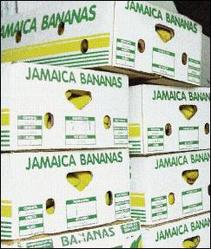David Jessop, Trade Writer

JP bananas packaged for ripening. Companies like Jamaica Producers Group will have duty-free and quota-free access to the European Union for their bananas. - File
The language that the Economic Partnership Agreement (EPA) with Europe contains on bananas is straightforward and clear. ACP Caribbean bananas will gain full duty-free and quota-free access to the EU market from the inception of the EPA.However, as with almost everything connected with this most fought-over of commodities, the difficulties lie elsewhere.As far as the EPA text is concerned, there is a joint declaration on bananas. In this both the European Commission (EC) and Cariforum formally recognise the importance of bananas to the economic development of a number of Caribbean nations as well as the employment, foreign exchange and social and political stability that the industry provides.Both parties also concur that banana exports to the EU have been helped in the past by a substantial tariff preference and that the maintenance of such preference for as long as possible would increase the benefits of the EPA to the region.This is followed by a statement from the Caribbean side alone, presumably indicating Europe does not agree, that Cariforum nations also consider that the possible reduction of the Most Favoured Nation (MFN) tariff - the euro176 per tonne that the EU imposes on non preferential banana imports - and the implementation of new free trade agreements such as those now being negotiated with Latin countries "would pose significant competitive challenges for the banana industry in several Cariforum countries."
Considering old pacts
Tortuous language then states that both sides will jointly agree on funding for programmes to enable the industry to further adjust to the new challenges by increasing the productivity and competitiveness where the industry is viable and through support for diversification and related social programmes.Bananas are also mentioned in a section of the EPA that deals with traditional agricultural products. Here, the EC commits itself to undertaking 'prior consultations' on trade policy issues that may impact on the competitive position of a range of Caribbean products, including bananas.This is taken by Caribbean negotiators to mean a commitment to consult in advance if the European Union (EU) removes or changes its tariffs in any new free trade agreement or in the context of the World Trade Organisation (WTO).More significantly in the same section the EPA commits the EU to "endeavour to maintain significant preferential access within the multilateral trading system for - (bananas, sugar rum and rice) - originating in the Cariforum states for as long as is feasible and to ensure that any unavoidable reduction in preference is phased in over as long a period as possible."All of which would seem to indicate an easier way ahead for those parts of the regional banana industry that are able to

